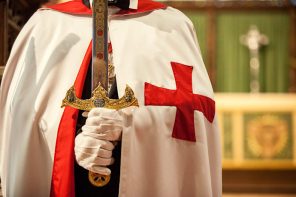After my piece on Michele Bachmann’s Christian (Reconstructionist) legal education was published, I received a note from Edward Sebesta, co-editor of two books on neo-confederates, Neo-Confederacy: A Critical Introduction (Univ. of Texas Press, 2008), and The Confederate and Neo-Confederate Reader: The “Great Truth” About the “Lost Cause” (Univ. Press of Mississippi 2010). He passed along one of his own essays, “The US Civil War as a Theological War: Confederate Christian Nationalism and the League of the South,” co-written with Euan Hague and published in the Canadian Review of American Studies, an eye-opening and extremely useful look at the ties between Christian Reconstructionists and the League of the South.
As I discuss in my Bachmann piece, the Christian Reconstructionists behind the Institute on the Constitution as well as the framework for teaching “biblical law” at Christian law schools like the one Bachmann attended at Oral Roberts University, have ties to the neo-confederate group League of the South. At Salon, Justin Elliott has a story, also based in part on Sebesta’s research, about the ties between Rick Perry, who has advocated for secession, and the LOS (which endorsed his 1998 run for lieutenant governor) and the neo-confederate group Sons of Confederate Veterans (of which he was a member).
For the ties between the neo-confederates and the Christian Reconstructionists, Sebesta and Hague’s essay is illuminating, and (without doing so explicitly) explains a great deal about how the “Christian nation” mythology promoted by David Barton and others has become enmeshed with a whitewashing of the history of slavery in the United States. Sebesta and Hague maintain that the League of the South, which advocates for secession and a second confederacy, bases its position on a nationalistic reading of the Bible:
This position is centred upon what we identify as the theological war thesis, an assessment that interprets the nineteenth-century CSA [Confederate States of America] to be an orthodox Christian nation and understands the 1861–1865 US Civil War to have been a theological war over the future of American religiosity fought between devout Confederate and heretical Union states. In turn, this reasoning leads to claims that the “stars and bars” battle flag and other Confederate icons are Christian symbols and the assertion that opposition to them equates to a rejection of Christianity.
Sebesta and Hague maintain that in the 19th century, theologians with the Southern Presbyterian Church advocated for this “theological war,” but by the early 20th century, their work had been marginalized—until popularized by theologians and activists, including Christian Reconstructionism founder R.J. Rushdoony:
[T]he theological war thesis originated in texts by theologians who between them contended that the Confederacy comprised an orthodox Christian nation, at times intertwining this religious viewpoint with, amongst other things, defences of slavery, denunciations of public education and mass schooling, and proposals to maintain a hierarchical and unequal society. . . .Once a marginal revisionist reading of the Civil War, we contend that groups as diverse as the Sons of Confederate Veterans heritage organization, Christian Reconstructionist bodies such as the Chalcedon Foundation, and the League of the South now generally accept the theological war thesis. Reaching a broad audience at conferences, through publications and on web sites, one of the League’s founding directors, Steven Wilkins, continues to develop theological interpretations of the Civil War. Operating within this historical trajectory, therefore, the League of the South has utilized the theological war thesis to promote a Christian nationalist commitment to constructing a new Confederate States of America.
An early advocate of the theological war theory, Sebesta and Hague maintain, was Robert Lewis Dabney, a 19th century clergyman who published a biography of Stonewall Jackson, and a theological dissertation on the meaning of the Civil war, in which he used passages from the Bible to defend slavery, claiming it was “a necessary good for what he called the ‘depraved’ lower classes.” He supported secession as “the only relation of domestic slavery as authorized by God, that we defend,” denounced abolition as “infidel” and “anti-scriptural,” and argued that opposing slavery was “tantamount to rejecting Christianity.”
Dabney, largely marginalized and rejected outside his Southern Presbyterian circles by the end of his life, was revived, Sebesta and Hague argue, as “since the mid-1960s conservative scholars and activists, at times operating within religious circles, have reevaluated and republished these marginal writings.” One of these scholars was C. Gregg Singer, who played a role in the formation of the Presbyterian Church of America (PCA), which “envisaged itself as a successor to the Presbyterian Church in the Confederate States of America (PCCSA), a denomination that had also formed in response to perceived heresy.” And R.J. Rushdoony, Sebesta and Hague discuss, believed the Union victory was a “defeat for Christian orthodoxy and paved the way for the rise of an unorthodox Social Gospel in the postbellum United States.” In addition, “Rushdoony has condemned public education and contended that the Civil War was not about slavery, but the consolidation and centralization of federal government power.” Rushdoony, Sebesta and Hague write, “applauded” Dabney’s defense of slavery.
Fast forward to the 1990s, and Sebesta Hague find the “theological war” gaining traction among neo-Confederates, like the League of the South, which was formed in 1994. One of its founding directors, Wilkins, is a member of the PCA who maintains that, according to Sebesta and Hague, “the cause of the Civil War was theological incompatibility between North and South, the former having ‘rejected Biblical Calvinism.'” Wilkins has written that “there was radical hatred of Scripture and the old theology [and] Northern radicals were trying to throw off this Biblical culture and turn the country in a different direction,” and that “the War Between the States was a war between two different world views: The old way of Biblical Constitutionalism and the ‘new’ way of Humanistic Centralism.”
As the “theological war” hatched in the 19th century became increasingly popularized in the late 20th century, Sebesta and Hague conclude that “by the turn of the twenty-first century, therefore, this once peripheral interpretation of the Civil War as a theological struggle between orthodox Christian Confederate states and heretical Union states has gained credibility and adherents, becoming intertwined with wider Confederate heritage and conservative Christian opinion.”
From marginalization to the halls of Congress, to the campaigns of would-be presidents: the League of the South, which, in addition to having ties to GOP presidential candidates, is a big promoter of restoring the gold standard, an issue popularized by Ron Paul and taken up by other conservative groups.
Perry has links to neo-Confederate groups, and has himself promoted secession and lambasted federal government power. Tim Murphy picked up a gem of a Perry quote yesterday at Mother Jones, in which Perry describes the economic crisis in decidedly Reconstructionist terms:
“I think we’re going through those difficult economic times for a purpose, to bring us back to those Biblical principles of … not spending all of our money, not asking for Pharaoh to give everything to everybody and to take care of folks, because at the end of the day, it’s slavery. And we become slaves to government.”
Perry is hosting a prayer rally because “a historic crisis facing our nation and threatening our future demands a historic response from the church.” Does he see himself as a general of sorts in the neo-Confederate theological war?




